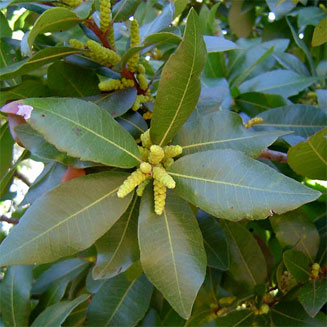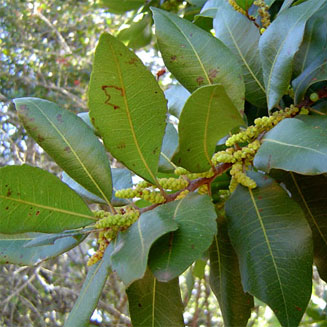Morella pilulifera (Broad-leaved
waxberry)
[= Myrica pilulifera]
BreŽblaarwasbessie [Afrikaans]
Life
> eukaryotes >
Archaeoplastida >
Chloroplastida
>
Charophyta > Streptophytina > Plantae (land plants)
> Tracheophyta (vascular plants) > Euphyllophyta > Lignophyta (woody plants)
> Spermatophyta (seed plants) > Angiospermae (flowering
plants) > Eudicotyledons > Core Eudicots > Rosids >
Eurosid I > Order: Fagales
> Family: Myricaceae > Genus:
Morella
 |
 |
|
Morella pilulifera, Cecil Kop Nature
Reserve, Mutare, Zimbabwe [photos Bart Wursten ©, Flora of Zimbabwe] |
Identification
A small tree, usually 3-4 m high, but can grow
to 12 m high. Leaves are elliptic to oval, 3-7 cm long and are
broadly tapering to rounded basally. Margin of leaf can be smooth or
toothed. Young leaves are hairy. Has separate male and female
flowers on the same plant or on separate plants. Flowers are small
and in short spikes. Fruit are small, spherical and dark brown to
black in colour, with a waxy covering.
Distribution and habitat
Found in mountainous regions of KwaZulu-Natal,
Swaziland, Mpumalanga, Limpopo and Northwest Province. Grows along
streams, on grassy hillsides and on forest fringes.
Phenology
Flowers from July to September.
Fruit have been recorded in October and
November.
Ecological interactions
No information.
Links
References
- Palgrave, K.C. and Palgrave, M.C. 2002. Trees of Southern Africa.
3rd Edition. Struik Publishers, Cape Town.
- Palmer, E. and Pitman, N. 1972. Trees of Southern Africa covering all
known indigenous species in the Republic of South Africa, South-West Africa,
Botswana, Lesotho and Swaziland. Volume 1. A.A. Balkema, Cape
Town.
Text by Hamish Robertson |
